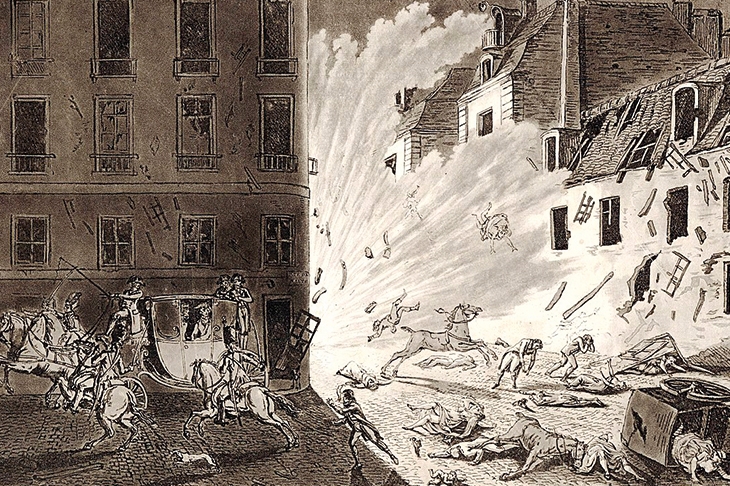Laws and sausages, we know, are better not seen in the making; and neither are ‘black ops’. Waterloo may have been won on the playing fields of Eton, and Trafalgar on the dunes near Burnham Thorpe, but Britain’s secret war against Napoleon was won in less wholesome places. ‘This is a book about propaganda, spying and covert operations… a very modern story of secret committees, slush funds, assassination,’ writes Tim Clayton, whose Waterloo: Four Days that Changed Europe’s Destiny was by far the most scholarly of the many volumes produced for the bicentenary. And what an astonishing story it all is, alternately inspiring and disturbing, a challenging addition to the Napoleonic canon.
‘Propaganda’ only gained a bad name during the Revolution and its wars, having thitherto been simply a benign neologism: Sacra Congregatio de Propaganda Fide, an organ of the papacy for the propagation of the Faith. But if French propaganda was less than truthful, says Clayton, the British variety was thoroughly mendacious. It had to be, as the British public had at first welcomed the post-absolute monarchical constitution emerging in France, Charles James Fox and the Whigs particularly — at least until the insatiable guillotine started to make them queasy. After all, hadn’t we been fighting one Bourbon king or another for 100 years?
‘British propaganda made the central issue the question of whether or not Napoleon was really a villain,’ says Clayton. Its object was to deflect attention from what the British themselves were up to: the silencing of opposition at home, and direct action abroad.
Neither was pretty. This Dark Business opens with a forensically detailed account of the botched assassination attempt on the first consul — Bonaparte — on Christmas Eve 1800. The bomb, detonated a fraction too late to find its target, killed several innocent bystanders instead, including a young girl, and maimed dozens more. The Paris authorities at first ascribed it to ‘terrorists’ — ultra-Jacobins still wedded to the Terror — but it was in fact an operation paid for by the British government, the French conspirators transported from Britain to France by the Royal Navy.
C’est la guerre? The Special Operations Executive, created by Churchill in 1940 to ‘set Europe alight’, trained and transported Czech agents to Prague to blow up the SS Reichsprotektor of Bohemia and Moravia, Reinhard Heydrich. The death toll of innocents in the aftermath — including many women and children — ran to many hundreds. According to Clayton, Churchill studied Pitt’s methods.
Although it is obvious that Britain would wish to turn Napoleon into a monster, says Clayton, the story as a whole (the ‘how’ especially) has never been told. That the gambit proved so successful in the long term is evidential.
It took the likes of Edmund Burke, of all people, to begin to turn round government opinion. As early as 1790 he began prophesying the imminent destruction of European civilisation and demanding a crusade to restore the ancien régime. Yet as late as February 1792, Pitt was telling the House of Commons that there never was a time like the present when from the situation in Europe the country might more reasonably expect 15 years of peace. Having then been proved spectacularly wrong, it would take a great deal of skill for Pitt to prosecute a war whose object was regime change, but which he could not openly declare.
One man who was in no doubt about what should be done was George III. Although a Francophobe (the French had helped the American revolutionaries rob him of his colonies — and he was also King of Hanover), he was hardly likely to be a republican. Clayton describes him as a driving force in the black ops, not least as a secret source of funding through the privy purse.
It is a fact of dirty warfare, though, that not all its practitioners, even the spymasters, come from good schools. There are 150 or so names listed in Clayton’s ‘cast of characters’ (Baroness Orczy meets John Le Carré). Their motives are various — noble, venal and unfathomable. At the MI6 end of the recruiting spectrum there was the Eton- and Oxford-educated barrister John Reeves, who had studied the Paris police a decade earlier, and who was charged with the expansion of the London police in 1792 (on the Bow Street model) to keep watch on French refugees flooding into the capital, and to prevent revolution. At the rather more MI5 end was Evan Nepean, son of a Cornish innkeeper, who had been apprenticed as a clerk in the Royal Navy before, in 1782, becoming an under-secretary at the newly created Home Office, and who masterminded the covert operations at home and abroad. What both had in common, however, was intense patriotism and capacity for hard work.
Clayton maintains that Pitt’s strategy aimed also to provoke Napoleon into action that further blackened his name, such as bringing back to power the brutal Fouché, minister of police. But here we run into the problem of assuming cause and effect. What is more certain is the law of unintended consequence. The exploding of Le Machine Infernale in the Rue Saint-Nicaise on Christmas Eve led to the consolidation of Bonaparte’s power by his elevation from first consul to emperor — though this, too, served, even if unexpectedly.
Clayton writes with a fine eye for detail. You smell the sewers in which these men (and some women) hid or escaped, the cells in which they were confined and sometimes died — and the fear. Some agents died as nobly as Sydney Carton. A few turned coat, prospered and lived long and serenely. On some, the knowledge of what they’d done, even unintentionally, preyed heavily: some committed suicide; Joseph Limolëan, who left the reins of the horse pulling Le Machine Infernale in the hands of the young girl, became a priest.






Comments